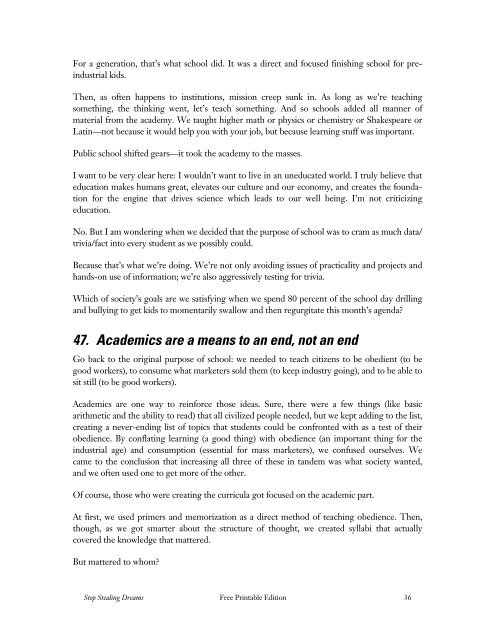1DO0vxU
1DO0vxU
1DO0vxU
Create successful ePaper yourself
Turn your PDF publications into a flip-book with our unique Google optimized e-Paper software.
For a generation, that’s what school did. It was a direct and focused finishing school for preindustrial<br />
kids.<br />
Then, as often happens to institutions, mission creep sunk in. As long as we’re teaching<br />
something, the thinking went, let’s teach something. And so schools added all manner of<br />
material from the academy. We taught higher math or physics or chemistry or Shakespeare or<br />
Latin—not because it would help you with your job, but because learning stuff was important.<br />
Public school shifted gears—it took the academy to the masses.<br />
I want to be very clear here: I wouldn’t want to live in an uneducated world. I truly believe that<br />
education makes humans great, elevates our culture and our economy, and creates the foundation<br />
for the engine that drives science which leads to our well being. I’m not criticizing<br />
education.<br />
No. But I am wondering when we decided that the purpose of school was to cram as much data/<br />
trivia/fact into every student as we possibly could.<br />
Because that’s what we’re doing. We’re not only avoiding issues of practicality and projects and<br />
hands-on use of information; we’re also aggressively testing for trivia.<br />
Which of society’s goals are we satisfying when we spend 80 percent of the school day drilling<br />
and bullying to get kids to momentarily swallow and then regurgitate this month’s agenda?<br />
47. Academics are a means to an end, not an end<br />
Go back to the original purpose of school: we needed to teach citizens to be obedient (to be<br />
good workers), to consume what marketers sold them (to keep industry going), and to be able to<br />
sit still (to be good workers).<br />
Academics are one way to reinforce those ideas. Sure, there were a few things (like basic<br />
arithmetic and the ability to read) that all civilized people needed, but we kept adding to the list,<br />
creating a never-ending list of topics that students could be confronted with as a test of their<br />
obedience. By conflating learning (a good thing) with obedience (an important thing for the<br />
industrial age) and consumption (essential for mass marketers), we confused ourselves. We<br />
came to the conclusion that increasing all three of these in tandem was what society wanted,<br />
and we often used one to get more of the other.<br />
Of course, those who were creating the curricula got focused on the academic part.<br />
At first, we used primers and memorization as a direct method of teaching obedience. Then,<br />
though, as we got smarter about the structure of thought, we created syllabi that actually<br />
covered the knowledge that mattered.<br />
But mattered to whom?<br />
Stop Stealing Dreams Free Printable Edition 36


